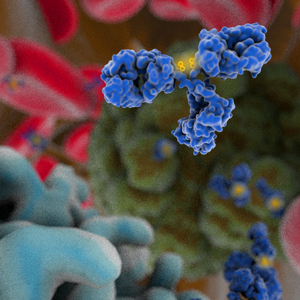 During the annual congress of the European Society of Medical Oncology (ESMO) in Copenhagen, interim clinical data for enfortumab vedotin (ASG-22ME) and ASG-15ME (Seattle Genetics and Agensys/Astellas) in patients with metastatic urothelial cancer were presented. Both enfortumab vedotin and ASG-15ME are investigational ADCs making use of the microtubule-disrupting toxin MMAE conjugated to anti-Nectin-4 and a SLITRK6-targeting antibody respectively. Nectin-4 and SLITRK6 are highly expressed in urothelial cancers, particularly bladder cancer but also include carcinomas of the ureter and renal pelvis.
During the annual congress of the European Society of Medical Oncology (ESMO) in Copenhagen, interim clinical data for enfortumab vedotin (ASG-22ME) and ASG-15ME (Seattle Genetics and Agensys/Astellas) in patients with metastatic urothelial cancer were presented. Both enfortumab vedotin and ASG-15ME are investigational ADCs making use of the microtubule-disrupting toxin MMAE conjugated to anti-Nectin-4 and a SLITRK6-targeting antibody respectively. Nectin-4 and SLITRK6 are highly expressed in urothelial cancers, particularly bladder cancer but also include carcinomas of the ureter and renal pelvis.
There is a high unmet need for patients with metastatic urothelial cancer. In 2016 approximately 77,000 people will be diagnosed and more than 16,000 will die from urothelial bladder cancer. For patients diagnosed with locally advanced or metastatic the average five-year survival is only approximately 15%.
The clinical trial data showed that each agent demonstrated anti-tumor activity in patients previously treated with platinum-based chemotherapy, checkpoint inhibitors, taxanes and those with liver metastases and were generally well-tolerated.
Of the 49 patients evaluable for response to enfortumab vedotin treatment, 18 patients (37%) had an objective response, including one patient (2%) achieving a complete response and 17 patients (35%) who achieved a partial response. The preliminary estimate of median progression-free survival is 16.6 weeks. The recommended phase II dose is 1.25 mg/kg.
Of the 48 patients evaluable for response upon ASG-15ME treatment, 18 patients (38%) showed an objective response, including one patient (2%) who achieved a complete response and 17 patients (35%) achieving a partial response. The preliminary estimate of median progression-free survival is 16.1 weeks.
Both agents demonstrated encouraging anti-tumor activity and safety in these patient groups, and these data support the scheduled advancement to later stage development.
In other ADC-related news this month, during the 7th World ADC conference in San Diego the winners of the 3rd World ADC Awards were announced. The World ADC Awards showcase excellence within antibody drug conjugate research and reward the innovation, leadership, and devotion shown by the best companies, teams, and individuals in the industry. Across eight categories winners were awarded which in full can be viewed here (http://worldadc-awards.com/awards-2016/winners/).
The award for Best ADC Platform Technology was won by the Fleximer platform developed by Mersana Therapeutics. Winner of the Most Promising Clinical Candidate
was the ADC Rovalpituzumab tesirine (developed by Abbvie-Stemcentrx). BSP Pharmaceuticals took the prize for Best Contract Manufacturing Provider and ADC Therapeutics won Best New Drug Developer. John Lambert was awarded for his Long Standing Contribution to the field.
Like this post? Please become a member!

